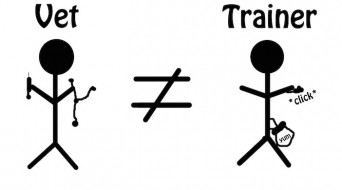 BY TENA PARKER
BY TENA PARKER
Success Just Clicks
for Lesbian.com
I love my vet, while we may not always agree, nutrition-wise, he respects my choices and never gives me a hard time about it. He is at the head of his field in terms of some ground breaking work being done with stem cells to improve spinal cord injuries, hip dysplasia, and arthritis. He is a well versed and devoted small mammal veterinarian specializing in rats. Honestly, I really do think he’s a fantastic veterinarian. I love his manners with his clients and their pets and I love that he is the type of vet who is always learning more and staying up to date with the latest information in his field.
That being said, I’ve heard him give some pretty questionable training advice to the general public. He does t.v. and radio spots regularly (when he’s not globe trotting performing the aforementioned stem cell therapies or talking about it at conferences) and on one such program he was asked, and chose to answer, a training question. Now, I do not recall the exact question or wording but it had to do with a dog in a fearful situation. His first piece of advice was not to coddle the dog, which eh, isn’t the worst advice but that particular phrase does bug me because reassurance can’t reinforce fear. He went on to say you should praise when they offer to be brave (which is fine) but that you should correct any fearful growls or nips (this is, as I mentioned the other day, not the best plan). He may not have meant physical corrections for growling, but as a viewer, that’s how I took it and that is concerning advice.
Every so often I come across either online advice, anecdotal stories from students, or online videos that are incredibly concerning about vets giving behavioral suggestions or information. I recently saw a video on youtube of a vet handling a 10 week old aussie puppy while telling his owner (in a very matter of fact way–very confident in the information he was sharing) all about “Alpha Holds.” He showed and explained that when a dog/puppy was being submissive he was loose while being held on his back but if the puppy got stiff or picked his head up, the puppy was being an alpha and it would be bad to let the puppy down in an alpha state of mind. In another video, the same vet is talking about alpha holds with adult dogs and at one point he was trying to show the dog in a submissive position on his side, but the dog’s legs were still stiff and the vet says, “Oh his paws are still alpha.” Really? Just the paws, umm… okay.
The point is that you can have the best vet in the world, from a medical standpoint, but that the vet is not necessarily qualified to give training/behavior advice. It would be like asking your physician about a cavity… it’s a related field but an expert in one does not make an expert in the other.
Veterinarians are in school for quite a long time and are responsible for knowing a huge amount of information–they are pediatricians, surgeons, dentists, oncologists, general physicians, and dermatologists… for more than one species! They have a lot to master and behavior/training just isn’t one of them. There are certainly things they may have learned either with their own pets or though just being around dogs, but again, that does not make them an expert or an authority in behavior/training (I’ve learned how to crudely adjust bike brakes out of experience…but that does not make me a bicycle mechanic or expert). If you have a pressing behavior/training question, you would probably be given a more up to date and accurate information if you ask a trainer and not a vet.
There are, however, some veterinarians educated in behavior and who might even be board certified veterinary behaviorists, who have been schooled in both disciplines (certified veterinary behaviorist is a specific title that is earned through degrees in both fields). If you happen to have one of these locally, they can be much better sources for behavioral information (especially when it’s also connected to veterinary issues like hyper/hypothyroidism). Here in Pittsburgh we are about 4 hours away from the nearest certified veterinary behaviorists (Ohio St. and a handful in eastern PA).
All of this isn’t to say all vets are completely clueless to training/behavior issue, only that sometimes you need to take it with a grain of salt and remember that while they are highly educated and experts in an animal field, they are not necessarily educated or trained to be behaviorists or trainers. I don’t think it’s a bad thing to tell your vet any behavior/training problems you are having with your dog since they may have a good trainer to refer you to but it is out of their field and their advice may not necessarily be the most sound. Sometimes even the best vets can give really bad training advice.
Tena Parker M.S., has been working with dogs for over 10 years. She is the owner of Success Just Clicks Dog Training in Pittsburgh, PA, has a thriving daily dog blog online, is a member of the APDT (Association of Pet Dog Trainers), is a Certified APDT C.L.A.S.S Evaluator (and instructor), is a Certified AKC Canine Good Citizen and S.T.A.R. Puppy Evaluator, and is a Certified Mentor Trainer for Animal Behavior College. She also teaches popular dog training classes through Western Pennsylvania Humane Society’s Get Smart! Training School several days a week.






